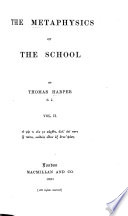 Newton generalized the law of attraction into a statement that every particle of matter in the universe attracts every other particle with a force which varies directly as the product of their masses and inversely as the square of the distance between... Newton generalized the law of attraction into a statement that every particle of matter in the universe attracts every other particle with a force which varies directly as the product of their masses and inversely as the square of the distance between...  Elements of Natural Philosophy - Page 161by William Thomson Baron Kelvin, Peter Guthrie Tait - 1873 - 279 pagesFull view Elements of Natural Philosophy - Page 161by William Thomson Baron Kelvin, Peter Guthrie Tait - 1873 - 279 pagesFull view - About this book
 | Thomas Harper - Metaphysics - 1881 - 798 pages
...the kind of Judgments here alluded to. Take, for instance, the law of universal gravitation, — that every particle of matter in the universe attracts every other particle with a force directly proportioned to the mass of the attracting particle, and inversely to the square of the distance... | |
 | Thomas Harper - Metaphysics - 1881 - 798 pages
...the kind of Judgments here alluded to. Take, for instance, the law of universal gravitation, — that every particle of matter in the universe attracts every other particle with a force directly proportioned to the massoflAe attracting particle, and inversely to the square of the distance... | |
 | Albert Taylor Bledsoe, Sophia M'Ilvaine Bledsoe Herrick - Periodicals - 1869 - 534 pages
...medium of the Philosophia? Naturalls Principia Mathematica. The law of universal gravitation, that 'every particle of matter in the universe attracts every other particle, with a force directly proportioned to its mass, and inversely to the square of its distance from the particle attracted,'... | |
 | John McGovern - Encyclopedias and dictionaries - 1880 - 762 pages
...Astronomer, who immediately recognized and promulgated the law of Universal Gravitation, as follows : " Every particle of matter in the Universe attracts every other particle with a force proportional to the quantity of matter contained in each, and decreasing inversely as the squares of... | |
 | Simon Newcomb, Edward Singleton Holden - Astronomy - 1880 - 542 pages
...NEWTON was able to formulate his great law of universal gravitation in these comprehensive words : ' ' Every particle of matter in the universe attracts every other particle with a force directly as the masses of the two particles, and inversely as the square of the distance which separates... | |
 | Edward John C. Morton - 1880 - 58 pages
...satisfies the facts. | V. — Of the verification of the Law of Gravitation. 1. The Law of Gravitation. Every particle of matter in the Universe attracts every other particle with a force varying directly as the product of their masses, and inversely as the square of the distance between... | |
 | Simon Newcomb, Edward Singleton Holden - Astronomy - 1881 - 544 pages
...NEWTON was able to formulate his great law of universal gravitation in these comprehensive words : " Every particle of matter in the universe attracts every other particle with a force directly as the masses of the two particles, and inversely as the square of the distance which separates... | |
 | Robert Routledge - Science - 1881 - 748 pages
...all physical laws was finally deduced by Newton, namely, the Law of Gravitation, which affirms that every particle of matter in the universe attracts every other particle with a force which is inversely proportional to the squares of the distances between them. Newton demonstrated that... | |
 | Edmund Ledger - Astronomy - 1882 - 490 pages
...one•half of that for Mticury. century, subsequently discovered the great law of gravity, viz., that every particle of matter in the universe attracts every other particle with a force which is proportional to the inverse square of their distance apart, he showed that two other laws... | |
 | Edward John Chalmers Morton - Astronomers - 1882 - 370 pages
...unquestionably the most remarkable discovery ever made by the mind of man. It may be stated as follows : — " Every particle of matter in the universe attracts every other particle with a force varying directly as the product of their masses and inversely as the square of the distance between... | |
| |